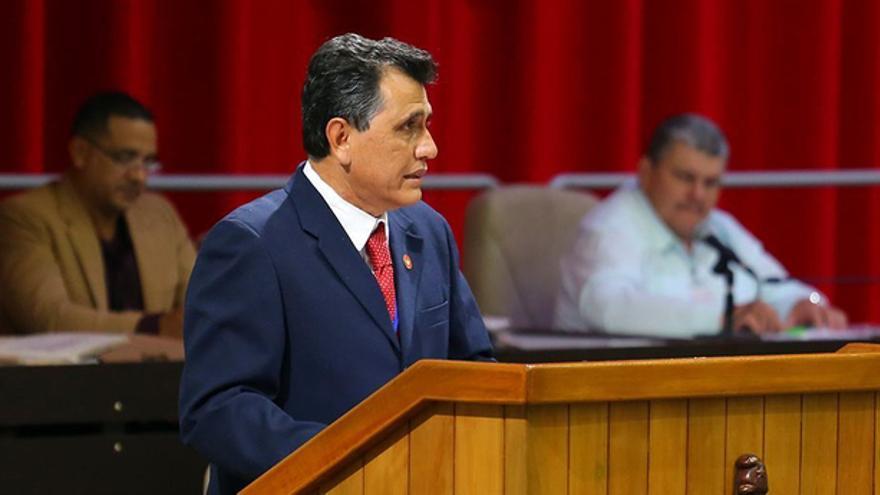
![]() 14ymedio, Havana, 23 December 2023 — The governor of Las Tunas reported to Parliament this Friday that 2023 has been one of the most disastrous years for the province in economic, health and social matters. With a contrite face and a thick report in his hand, Jaime Chiang translated into numbers the alarming infant mortality rate, state corruption, inflation and crime.
14ymedio, Havana, 23 December 2023 — The governor of Las Tunas reported to Parliament this Friday that 2023 has been one of the most disastrous years for the province in economic, health and social matters. With a contrite face and a thick report in his hand, Jaime Chiang translated into numbers the alarming infant mortality rate, state corruption, inflation and crime.
But not everything has been the fault of his administration, the politician warned, but also of the “situation of ungovernability and disobedience in the population” caused by the “enemies of the Revolution,” also responsible for the blockade and the “energy contingency,” he insisted. Hence, Las Tunas will lack 1,481 million pesos to fulfill its total net sales plan in the first half of the year, which remained at 5,289 million.
There are 34 entities responsible, the report specifies, due to “lack of demand, rigor and responsibility on the part of some cadres.” Among the recurring problems are the “deficient management of collections, “the “chain of non-payments” and the “insufficient economic and financial administration.”
Las Tunas, in short, spent 185 million pesos more than the state budget allowed, about 3,511 million
Food insufficiency, whose production was neglected by the provincial government, was especially serious for raw sugar, rum for export, corn and beef. Chiang complained that all these products had to be guaranteed by the province under “order of the State,” and they couldn’t be. The production of another 99 “articles” also failed, almost all linked to the food industry and many to construction.
Las Tunas, in short, spent 185 million pesos more than the state budget allowed, about 3,511 million. Once again, Chiang was able to point out the specific culprits of the spending: the municipalities of Las Tunas, Puerto Padre, Manatí, Jesús Menéndez and Amancio. Forty-eight “disciplinary measures” were also applied, including three dismissals and multiple fines and warnings.
But it is in Public Health where the outlook is most worrying. The province’s infant mortality rate in 2023 was 7.83 per 1,000 live births, which represents an increase over the previous year, when a rate of 6.96 per 1,000 children was recorded. The cause of death in 73% of the cases was low birth weight.
As for health and education, Chiang was more vague and said that he hoped that next year 85 percent of teaching activities would have a “good” level, although for that a lot of “improvement” is needed.
Transport, another of the sectors in crisis, met only 37% of its plan. Of the more than 13 million “passengers to be transported” in the province during 2022, only 4.92 million were moved. The situation did not change in the first half of 2023, even with the modest target of 6 million: they only transported 2,495 million, not only because of the shortage of fuel but also “because of the lack of batteries and tires.” The domino effect was felt in the distribution of the basic family basket, especially in those areas of the province where people have to go by rail or boat.
But Las Tunas has won the title this year for being “the driest province in the country.” About 16 communities, which total 9,640 inhabitants according to the official report, are still without water, and when they receive it, it’s only thanks to the Communal Services watertrucks. Chiang did not say if the provincial government will take measures, next year, to resolve the situation once and for all.
About 16 communities, which total 9,640 inhabitants according to the official report, are still without water, and when they receive it, it’s only thanks to the Communal Services water trucks
More than 20,300 homes in the province are in poor condition, 10 percent of the province’s constructions, the report continues. In the 41 vulnerable neighborhoods registered, 829 families live in a situation that the State considers precarious. Here, once again, the provincial government apologizes but accuses the pandemic and the “insufficient supply of materials” available. “The main causes of non-compliance with the plan were the lack of cement, steel, finishing elements, sand and other dry materials, flooring and wood,” he added.
The one success in Las Tunas – as in the whole island – is in the “confrontation of crime,” which has proven to be a gold mine for the state coffers. About 8,488 “control actions” to collect overdue fines and detect financial irregularities contributed to raising 15,531 million pesos. But at this point Chiang could not claim victory either: “Despite the increase in all the indices of confrontation and imposition of fines, the directives have not been effective.”
Translated by Regina Anavy
____________
COLLABORATE WITH OUR WORK: The 14ymedio team is committed to practicing serious journalism that reflects Cuba’s reality in all its depth. Thank you for joining us on this long journey. We invite you to continue supporting us by becoming a member of 14ymedio now. Together we can continue transforming journalism in Cuba.
